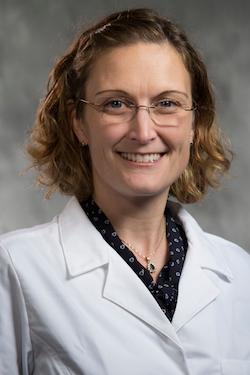
For life-altering cases of optic neuropathy and unexplained vision loss, having a skilled neuro-ophthalmologist to investigate and resolve the complicated symptoms can be key to optimizing patient outcomes. In this Q&A, Chantal Boisvert, MD, OD, the new chief of Duke’s Neuro-Ophthalmology Division, describes her plan for growing not only the multidisciplinary division at Duke but also the profession itself.
Q: What priorities do you have for the division?
Boisvert: I want to challenge the perception around the non-surgical nature of the profession of neuro-ophthalmology. A lot of our work involves significant time and research dedicated to solving difficult cases of unexplained vision loss, so it’s definitely an intellectual profession, but it can also be surgical.
Duke neuro-ophthalmologists can and still do surgeries, including temporal artery biopsy, optic nerve sheath fenestration, anterior orbital biopsy, and strabismus repair. We also perform Botox injections for hemifacial spasm and blepharospasm, and periocular/occipital nerve blocks for patients with severe neuropathic pain. In fact, we are actively looking to grow our surgical practice, as double vision treatment and strabismus surgery are my niches.
We’re also expanding the Neuro-Ophthalmology Division in terms of the number of providers to be able to offer better neuro-ophthalmology coverage for patients from all over the southeast. However, this is challenging because of the limited number of neuro-ophthalmologists in the field.
Q: How is Duke addressing the challenge of recruiting new physicians in the field of neuro-ophthalmology?
Boisvert: One reason for the lack of interest in the profession is the perception that neuro-ophthalmology is mostly a non-surgical specialty. Since both neurologists and ophthalmologists can specialize in neuro-ophthalmology, it is a very diverse profession with many different possibilities. To address this challenge, we are restarting a fellowship program beginning in Summer 2020 for both ophthalmology- and neurology-trained physicians interested in being trained in neuro-ophthalmology. We are also working on making the fellowship compliant with the Association of University Professors of Ophthalmology. I want our residents to consider neuro-ophthalmology as a possible career choice; ophthalmology is about saving vision, but neuro-ophthalmology is sometimes also about saving lives.
Q: How does the Neuro-Ophthalmology Division collaborate with other departments in the health system?
Boisvert: Because our cases are rarely straightforward, patients come to us from many different places. Even if the issue is not necessarily neuro-related, we are the detectives who do all the testing to identify the source of the problem. We work in very close collaboration with the Duke departments of neurology, neurosurgery, neuro-oncology, and rheumatology, as their patients often have systemic problems that also effect the eye. One of our division priorities is to continue streamlining communication across departments.
Q: What current neuro-ophthalmic research is the division engaging in?
Boisvert: Duke has one of only a few programs that is part of a multicenter study called OPEN-UP, and our division is partnering with Duke Neurosurgery on research for patients with idiopathic intracranial hypertension to see if doing a stent in the venous system of the brain is as effective as doing a CSF shunt. The hope is that a stent will be less invasive, last longer, and be a safer procedure in the long run. We are very interested in studying this newer, somewhat controversial surgical technique, which is already happening at Duke, to help us quantify the long-term improvement in the optic nerve and overall vision.
Article originally appeared in Clinical Practice Today